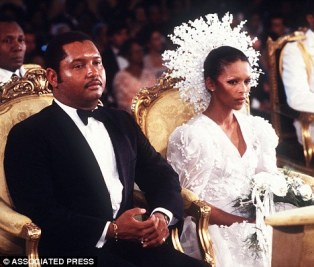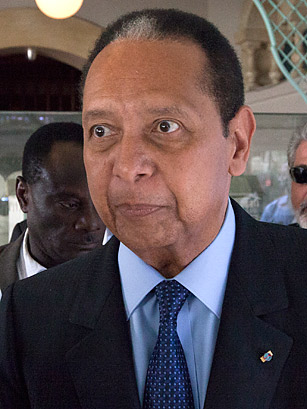By Kyle Orton (@KyleWOrton) on October 6, 2014
It might have come as a shock to some that a dictator who took power in 1971 and was deposed in 1986 was even still alive, but such is the case with Jean-Claude Duvalier, who died on Saturday. The fact that Duvalier took power in Haiti at the age of 19 was only the least of the weirdness of the dynasty established by his father, Francois, who had been a medical doctor and fashioned himself “Papa Doc” in official propaganda (an honorific passed to Jean-Claude in the succession, hence “Baby Doc”). When I began my interest in geopolitics I came in through what might be called “Atrocity Studies,” and in such a field there is no avoiding the thirty-year of rule of terror and plunder imposed on the luckless people of Haiti by the Duvalier family.
If “Baby Doc” has any redemption it is in how relatively good he looks next to his father. Francois Duvalier came to power by election in 1957 and immediately set about consolidating an authoritarian regime. Basing his support among the majority black (Creole) population against the minority mulatto (mixed) population, which had historically been dominant, Duvalier rode a populist wave to silence and exile opponents. After an attempted coup in 1958, Duvalier Sr. got more openly violent, disbanding the army and relying instead on the infamous Tonton Macoute. Tonton Macounte were technically not a regime paramilitary but a volunteer militia, not unlike the Shabiha in Syria. Fanatically loyal to a dictator they believed to be something a little more than human, Tonton Macoute were not paid by the State but allowed to roam the countryside with machetes, raping and murdering at will, and extracting rents by extortion and terror from the local population. Duvalier Sr. was a micro-managing tyrant, even overseeing torture sessions involving submerging oppositionists in sulphuric acid, and is in that very rare class—with only Saddam Hussein and Joseph Stalin—of having rigged a vote to claim one-hundred percent in his favour. His cult of personality and invocation of Voodoo as a State religion formed one of the strangest regimes of the twentieth century. Duvalier Sr. had all the black dogs on Haiti killed after alleging that a political opponent had turned into one; he had the head of a political opponent brought to him on ice so that he might commune with his spirit; and annexed imagery that suggested he was actually a god.

In happier times: All most of the outside world knew of “Baby Doc,” apart from his rumoured lack of intelligence, was his portly visage
“Baby Doc” does not seem to have been a sincere believer: the perks of office meant much more to him. He was his father’s son, however. Between 20,000 and 30,000 people were killed by “Baby Doc” alone; together the long night of Duvalierism killed 40,000 to 60,000 Haitians. Unlike many dictators who can claim some kind of economic progress, the Duvaliers could claim none. In one of the most cynical manoeuvres on record, the Duvaliers used to invite in international observers to see the widespread, crushing poverty of the Haitians, and when the aid donations came through to try to alleviate this predicament, the money would be syphoned off into private bank accounts by the ruler and his retainers.
How much Duvalier Jr. took with him when he made a run for it in the face of a popular uprising is anyone’s guess. Anything from four-hundred- to nine-hundred-million dollars is the commonly-given estimate. In some ways worse even than the killing and theft was Duvalier’s complete lack of shame or repentance. Having fled to the French Riviera, Duvalier burned through his fortune quickly and then engaged in a tawdry divorce dispute in 1993. Having been nearly wiped out by that, Duvalier was kept afloat by the donations of ordinary Haitians in France, including cab drivers, who for reasons best-known to themselves felt this was the right thing to do, and Duvalier took it as no more than his due. Interviewed by the Wall Street Journal in 2003, Duvalier said, “I laugh when I hear the amounts: $400 million, $800 million. It’s a lot of blah, blah, blah.” The only contrition he had was this: “Perhaps I was too tolerant.” Leaving behind him innumerable unpaid bills, including for hotels, Duvalier returned to Haiti almost exactly a year after the massive earthquake in January 2010 that destroyed much of the capital city and at least half of the government. Almost inexplicably, Duvalier was greeted a cheering crowd on his return. He was arrested, and was technically on trial when he died, but the charges never went beyond the corruption; there was never, and now will never be, a reckoning for the human rights abuses in the Duvalier years.
The legacy of Duvalier lingers still. Elizabeth Abbott in her biography of the Duvalier dynasty, written not long after its fall, concluded that Haiti would take decades to recover, it if ever did, from what the Duvaliers had done. The Duvaliers did not just strip out from Haiti (the educated, the politically capable, assets) but poisoned what remained, namely the institutions, tainting politics with sectarianism, politicising the army and police, and installing a patronage system that still hasn’t been rooted-out.
One element of the Duvalier legacy that deserves proper attention is the West’s role. While popular notions prevail of Duvalier as just another Latin American tyrant who was “our son of a bitch,” in fact it was much more complicated. Duvalier Sr., for example, not least because of his lurid sadism and ostentatious strangeness—to say nothing of his flirtations with Fidel Castro—was not liked by the United States. (Duvalier Sr.’s claim to be responsible for President Kennedy’s assassination via a curse likewise didn’t help.) From the mid-1960s, especially after the near-miss of a thermonuclear holocaust because of Castro and the U.S. intervention to put down a Communist revolt in Haiti’s neighbouring Dominican Republic, Duvalier Sr. was grudgingly accepted as someone who could be worked with. This was the situation when Duvalier Jr. took office.
The neglected aspect is Duvalier Jr.’s fall. In the Journal interview, Duvalier said: “If I were dictator, I would have done everything in my power to stay in power.” But the fact is, as Ms. Abbott put it in 2011, Duvalier was “forced to flee … under U.S. pressure“. So stern a critic of Western practice as Thomas Carothers in his book In The Name Of Democracy, a critical look at President Ronald Reagan’s Latin America policy, agrees with this—albeit grudgingly (he says Reagan’s policy was “reactive” (p. 184).) But he makes clear that without American pressure there would not have been a “peaceful and rapid departure” of Duvalier. Carothers also makes clear that the U.S. did as much as it could—which wasn’t much—in ensuring an evolution toward democracy in Haiti after Duvalier, even crediting Elliott Abrams with being a driving force in having Duvalier cut clean and in maintaining the pressure on the new government for democratic reform. (Abrams’ role in the Iran-Contra fiasco has made him a favourite hate-figure of those who dislike Reagan’s policies in the Western Hemisphere, especially the concerted effort to bring down the Sandinista dictatorship.) If the indulgence of tyrannies on an anti-Communist basis is to be charged to the American account, so she must be credited when she comes to her senses, as she did with Duvalier, Marcos, Pinochet, Noriega, and so many others.
It’s also not right to blame the U.S. for creating either the conditions that gave rise to the Duvaliers nor their actual ascension. Haiti is a concrete case where the U.S. tried for very nearly a century to institute constitutional government. The U.S. occupied Haiti between 1915 and 1934, and when she withdrew, as Max Boot has pointed out, the gains were considerable:
“1,000 miles of roads constructed, 210 major bridges, 9 major air-fields, 1,250 miles of telephone lines, 82 miles of irrigation canals, 11 modern hospitals, 147 rural clinics, and on and on.” (P. 180.)
The call however was for the “Good Neighbour Policy,” for the end of America’s Imperial interregnum (1898-1934). The roads crumbled and without U.S. protection the weak were pushed aside by predators. President Franklin Roosevelt said the U.S. would work with whoever was in power rather than trying to shape the politics of Central and Southern America. Oddly, U.S. alliances with the dictators who prevailed in the absence of the U.S. Marines did not seem to make the “anti-imperialists,” who had been so exercised about sullying America’s hands by governing foreign States, any happier. “In 1994,” as Boot points out, “the U.S. armed forces were back in Haiti, traveling down many of the roads built by Smedley Butler’s gendarmerie.” Unfortunately that expedition would also prove to be without serious staying power, and the rule of thumb—that the longer the U.S. stays, the better the outcome—would continue to hold.
Duvalier’s death, alas for Haiti, changes nothing one way or the other. It would have been nice to see him imprisoned at least for the economic crimes, but Duvalier’s damage is already done and Haiti might never recover from it. The lessons for the West are that indulgence of dictators is a failed policy, and pulling out the troops before the local institutions are powerful enough to sustain democracy leads to catastrophic results and greater cost later.

Pingback: Film Review: JFK (1991) | The Syrian Intifada